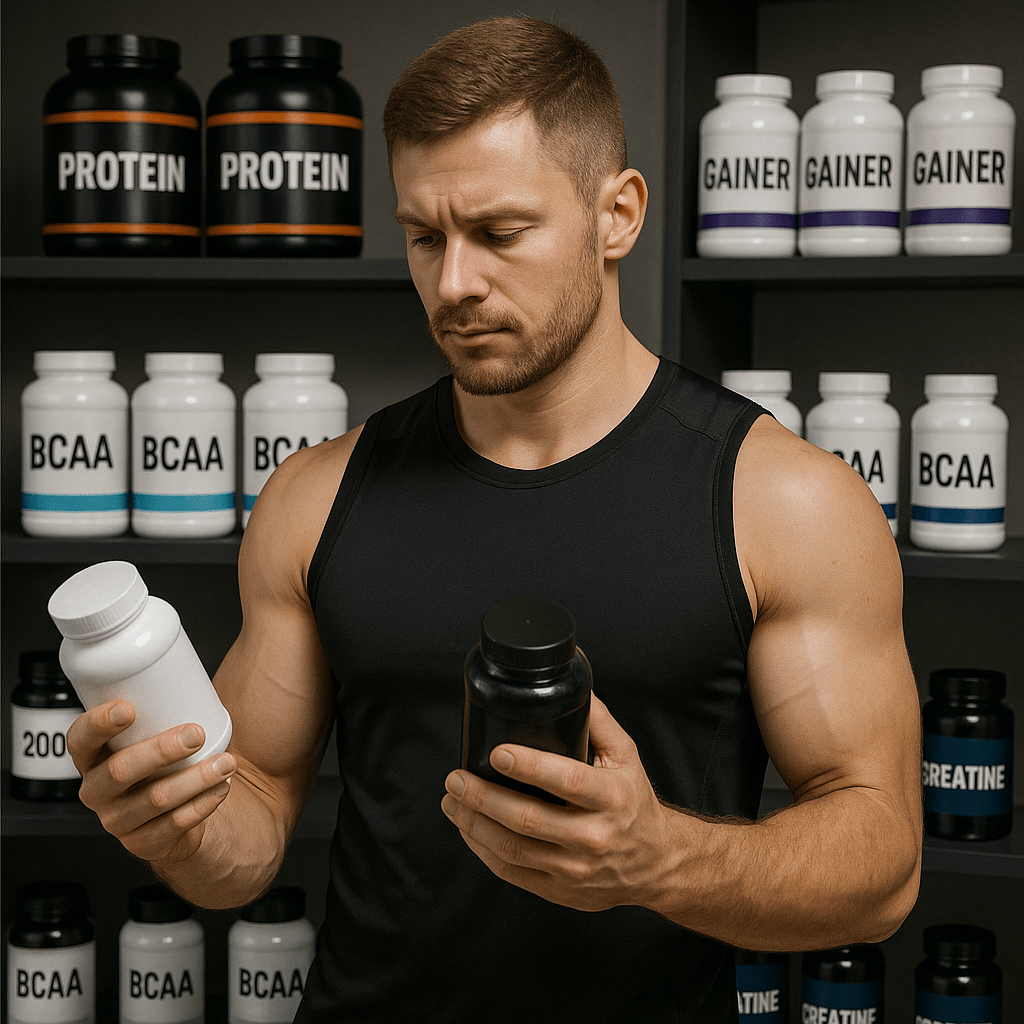The body of people who are actively exercising needs more nutrients than usual. Intense training, muscle strain, energy expenditure – all this increases the body’s needs, which are sometimes difficult to meet with food alone. This is where nutritional supplements come to the rescue – special products designed to supplement nutrition and ensure optimal functioning of the body during physical exertion.
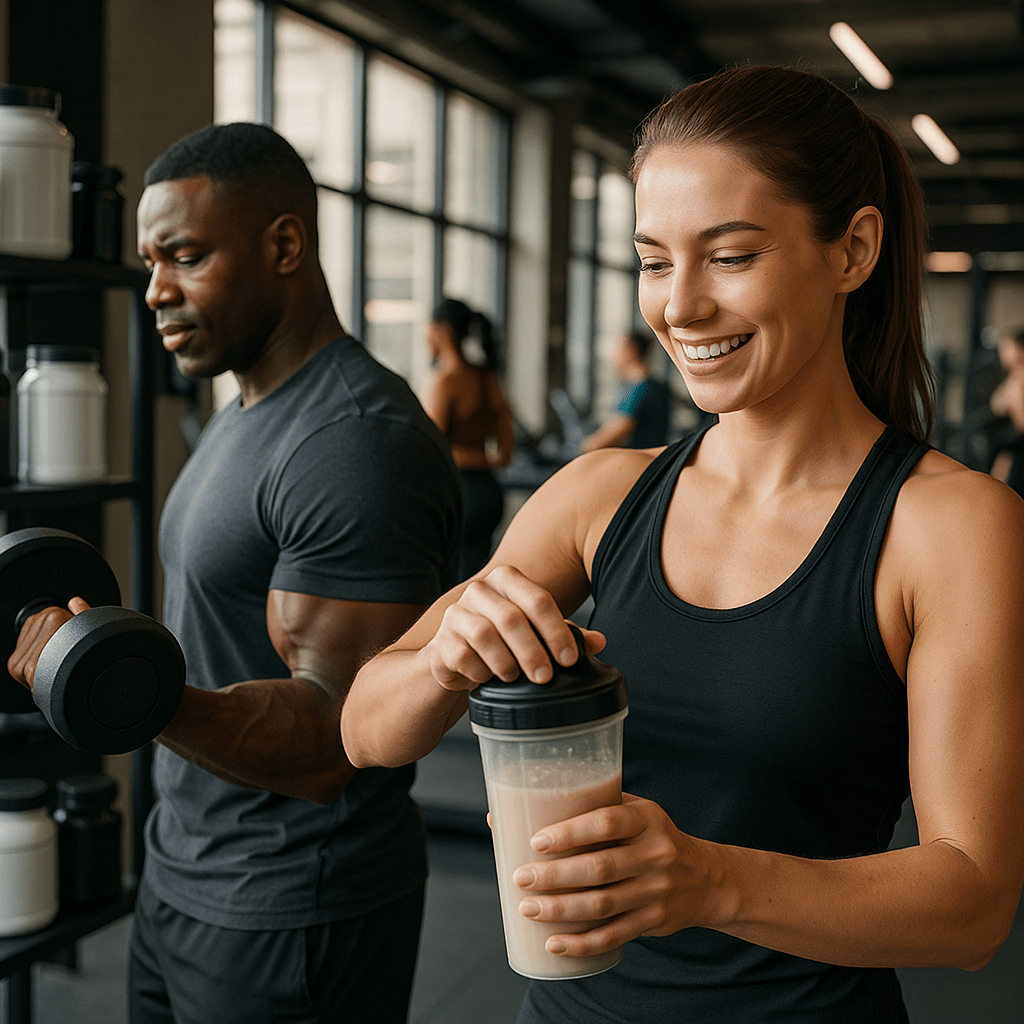
The sports supplement market is constantly expanding, and the choice is becoming larger. It is important to understand that supplements are not a miracle cure and cannot replace a balanced diet, but when properly selected, they can significantly improve sports performance, speed up recovery and maintain the overall condition of the body. Many athletes are also interested in natural food supplements that help maintain health in a holistic way.
In this article, we will discuss the ten most important food supplements that are worth including in their diet plan for people who are actively involved in sports, and why they are useful for achieving better results.
Why supplements are important for physically active people
Regular physical activity causes certain changes in the body that increase the need for nutrients. During intense training, muscle fibers are damaged, energy reserves are depleted, and important minerals are lost through sweat. These processes stimulate a greater need for vitamins, minerals and other nutrients, which cannot always be met with food alone.
An active lifestyle requires additional nutrients not only during training, but also during rest periods. The body needs to replenish energy stores, repair damaged tissues, and prepare for the next workout. In addition, nutritional deficiencies in athletes can lead to slower recovery, a higher risk of injury, and poorer athletic performance.
Supplements play an important role in sports nutrition—they help fill nutritional gaps, optimize body function, and speed recovery. It’s important to note that supplements aren’t necessary for everyone, but those who regularly engage in high-intensity exercise often find they have a positive impact.
The most important nutritional supplements for athletes
Each supplement has its own specific effects and benefits for an active body.
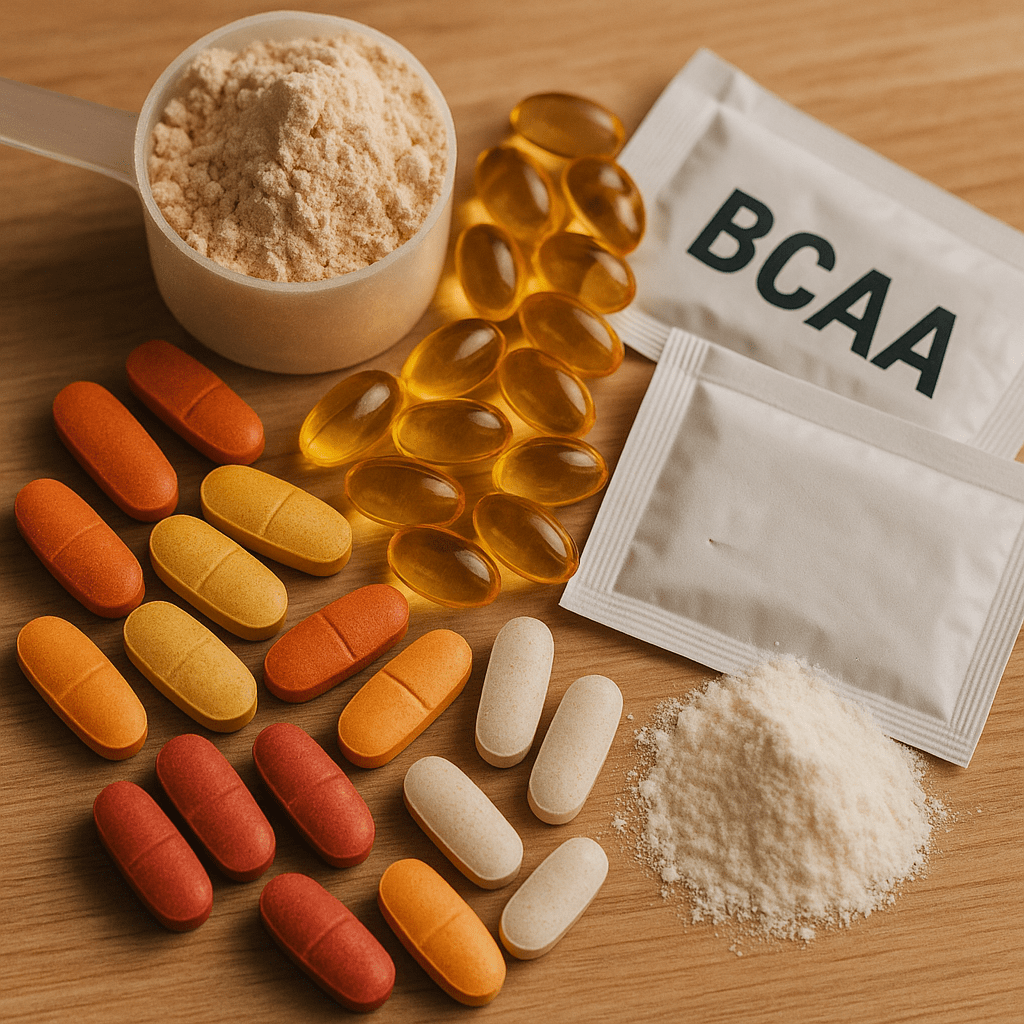
Below is a comprehensive list of the 10
most important supplements that can help you achieve better results, speed up recovery, and maintain overall health.
1. Protein (whey, plant, casein)
Protein is the main building block for muscle tissue. It plays a critical role in muscle repair, growth, and recovery from intense training. During exercise, muscle fibers undergo microtrauma, and protein helps repair and strengthen them.
Protein needs depend on the type of sport, intensity, and personal goals. Strength athletes are recommended to consume 1.6–2.2 g of protein per kilogram of body weight per day, while endurance athletes are recommended to consume 1.2–1.6 g/kg. Protein supplements are a convenient way to supplement your diet and ensure a sufficient amount of amino acids, especially after training, when the body needs them most.
2. BCAA (Branched Chain Amino Acids)
BCAA is a complex of three essential
amino acids (leucine, isoleucine and valine) that are particularly important for muscle metabolism. These amino acids are directly involved in protein synthesis and help reduce the breakdown of muscle fibers during intense physical exertion.
BCAA supplements can reduce exercise-induced muscle soreness, speed up recovery and improve endurance during long workouts. They are especially useful for people who train without eating or follow a calorie-restricted diet, as they help preserve muscle mass.
3. Creatine
Creatine is one of the best-studied and most effective sports supplements. It increases phosphocreatine stores in the muscles, which means more energy for intense, short-term efforts. Regular use of creatine can increase strength, muscle mass and improve recovery between sets of intense workouts.
Studies show that creatine can increase strength by an average of 5-10% and muscle mass by 2-4 kg over a 6-12 week training period. This supplement is especially beneficial for strength athletes, weightlifters, and sprinters.
4. Magnesium
Magnesium is a vital mineral involved in over 300 biochemical reactions in the body, including muscle contraction and relaxation. Intense exercise causes a large loss of magnesium through sweat, and a deficiency can lead to cramps, fatigue, and poor muscle function.
Magnesium supplements can improve sleep quality, reduce stress, improve muscle function, and help prevent cramps after intense workouts. Magnesium supplementation is especially important for those who exercise in hot weather or sweat heavily.
5. Omega-3 Fatty Acids
Omega-3 fatty acids, found in oily fish oil and some plant sources, have strong anti-inflammatory properties. They can reduce inflammation in muscles and joints caused by exercise, thereby speeding up recovery.
Regular omega-3 consumption can improve cardiovascular function, reduce joint pain, and help prevent injuries. This is especially important for athletes whose sports put a lot of strain on their joints, such as runners or weightlifters.
6. Electrolytes (sodium, potassium, calcium)
Electrolytes are minerals that help maintain fluid balance in the body, transmit nerve signals, and contract muscles. A significant amount of electrolytes, especially sodium and potassium, are lost through sweat, and a deficiency in these can lead to dehydration, fatigue, and muscle cramps.
Electrolyte supplements are especially useful during or after long, intense workouts, as they help restore fluid balance more quickly and ensure optimal muscle performance.
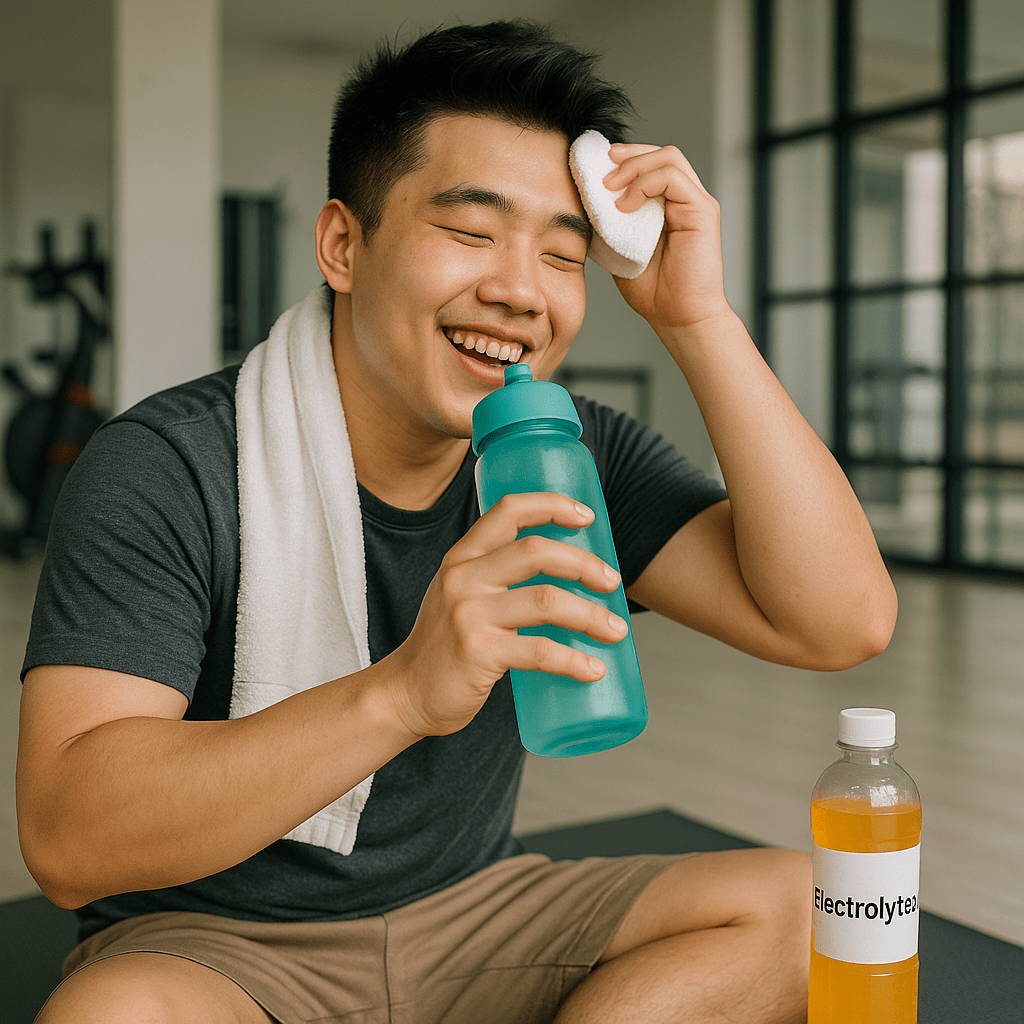
They can also improve endurance and prevent dehydration-related problems.
7. Vitamin D
Vitamin D plays an important role in calcium absorption, bone strength, immune system support, and muscle function. Many people, especially those living in northern latitudes with less sunlight, may be deficient in vitamin D.
For athletes, vitamin D supplements can help reduce the risk of injury, improve muscle function, and boost the immune system. Studies show that optimal levels of vitamin D can improve strength, reaction time, and overall physical performance.
8. Zinc
Zinc is a mineral essential for protein synthesis, immune system support, and hormone production. Intense exercise increases the need for zinc, and a deficiency can negatively affect testosterone levels, muscle growth, and overall recovery.
Zinc supplements can be beneficial for those who exercise intensely, especially in men, as it helps maintain optimal testosterone levels. This mineral is also important for immune system function, which is often weakened after intense exercise.
9. Collagen and Joint Complexes
Collagen is the main protein that makes up joints, tendons, and ligaments. Intense physical activity can cause wear and tear on these tissues, so collagen supplements can help maintain their health and reduce the risk of injury.
Joint complexes, which often contain glucosamine, chondroitin, and MSM, can reduce joint pain, improve mobility, and help prevent age-related joint problems. For those looking to maintain joint and connective tissue health, a quality collagen supplement is worth considering.
10. Probiotics
Probiotics are live bacteria that positively affect the intestinal microflora. A healthy gut microbiome is important for nutrient absorption, immune system support, and overall health.
Intense exercise can stress the digestive system and weaken immune function. Taking probiotics can improve nutrient absorption, boost the immune system, and help you recover faster. Recent research suggests that a healthy gut microbiome may even improve athletic performance and recovery.
How to Choose and Use Sports Supplements Safely
When choosing supplements, it is important to be guided not only by advertising or popularity, but also by scientific evidence and your personal needs. Here are some important aspects that are worth paying attention to before starting to use supplements.
First, assess your personal needs. Before starting to use any supplements, consult a doctor or nutritionist, who will take into account your health condition, sports goals and current diet. Consultation with a specialist is especially important if you have any health problems or are taking medications.
Pay attention to the quality of the product. Look for supplements that have official certificates, are tested in independent laboratories and are manufactured according to strict standards. Reliable manufacturers always indicate the exact composition, dosage and possible side effects.
Read the label carefully. Check that the product does not contain allergens that could cause a reaction, assess whether the supplement is of plant or animal origin, if this is important to you, and whether it does not contain unnecessary additives or fillers.
Stick to recommended dosages. More is not always better, and overdosing can lead to unwanted side effects. Avoid experimenting with untested supplement combinations and always start with lower doses to see how your body reacts.
Browse our full range of clean, plant-based and sports supplements to find the products that best suit your needs.
Supplements for different audiences: men, women and beginners
Athletes of different genders and experience levels may need different supplements, depending on their physiological characteristics and sporting goals.
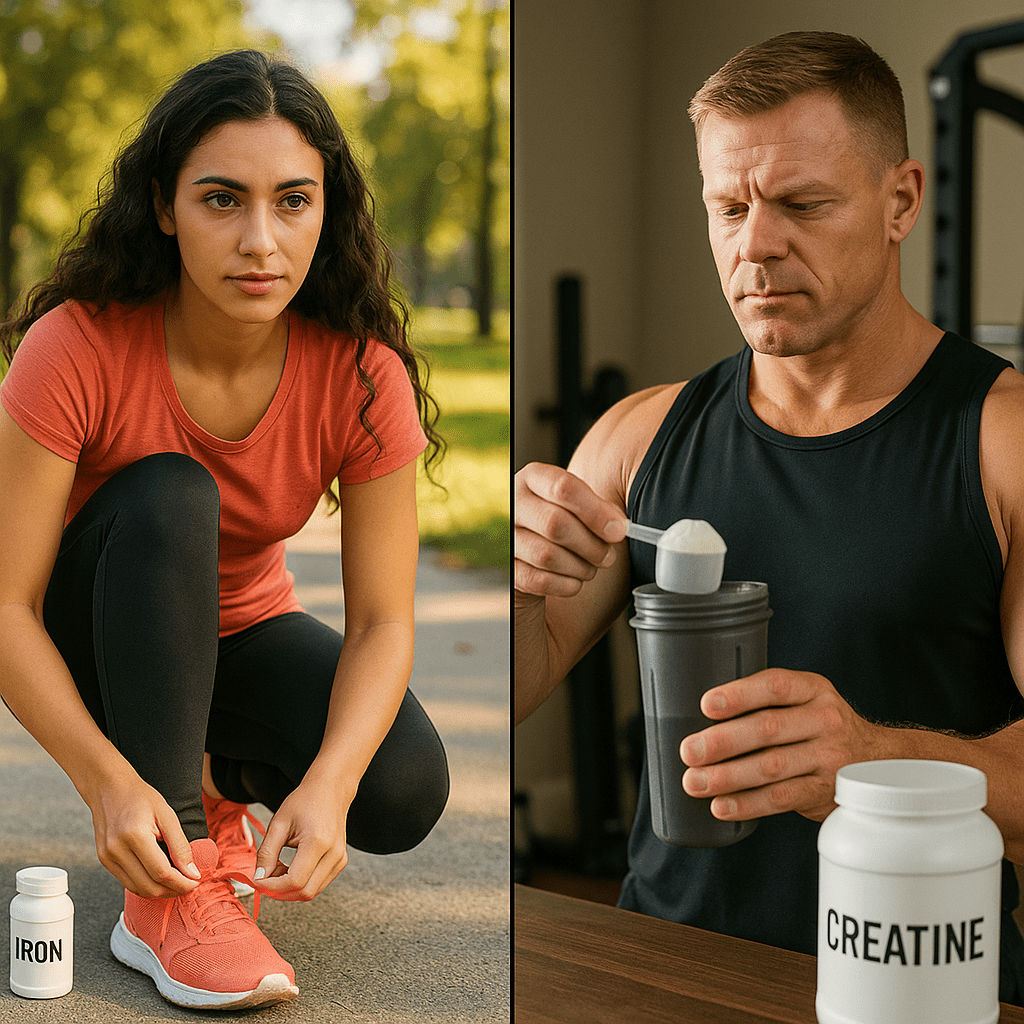
Here’s how supplement needs may differ between men, women, and beginners.
Men often need higher amounts of protein, zinc, and creatine, especially for those looking to increase muscle mass and strength. Zinc is important for testosterone production, which plays a role in muscle growth and strength development. Men may also benefit from magnesium supplements, which help maintain normal hormone levels and muscle function.
Women often need higher amounts of iron, calcium, and B vitamins, especially during menstruation, pregnancy, or menopause. Iron deficiency is very common among active women and can cause fatigue, decreased physical performance, and concentration problems. Calcium is essential for bone health, while B vitamins help maintain energy levels and normal nervous system function.
Beginners are advised to start with basic supplements, such as quality protein and magnesium, and then add other supplements as needed. It’s important not to overload yourself with too many supplements at once and to monitor how your body responds to each new supplement. To better understand the effects of supplements that support physical appearance, it is worth familiarizing yourself with vitamins for beauty and muscle health.
When and how to take sports supplements for the best results
The right time to take supplements can have a significant impact on their effectiveness. Depending on the type of supplement and your sports goals, the optimal time to take them may vary.
It is worth taking protein, BCAAs and creatine before training. Protein taken before training can help reduce the breakdown of muscle fibers during training. BCAAs can improve endurance and reduce fatigue, while creatine provides more energy for intense exercises. Caffeine-containing pre-workout supplements can also increase alertness and improve the quality of training, but they should be used with caution.
It is especially important to consume protein after training, which helps to start the muscle recovery process. Electrolytes, which help restore fluid balance, and magnesium, which can help reduce muscle tension and speed up recovery, are also useful. The ideal time to consume protein after a workout is within the first 30-60 minutes, when your body is most ready to absorb the nutrients.
Vitamins and minerals are usually taken daily, regardless of your workout schedule. However, some are best taken with food for better absorption. For example, fat-soluble vitamins (A, D, E, K) are better absorbed when taken with fat-containing foods, while minerals like iron can compete with each other for absorption, so they are best taken at different times.
Find a wide range of sports nutrition products tailored to your personal training schedule.
It is important to remember that supplement consumption schedules should be individualized, taking into account the nature, intensity and personal goals of your training. Experiment with different times and observe how your body responds to find the optimal consumption regimen.
In conclusion, we can say that nutritional supplements are a valuable tool to help you maintain an active lifestyle and achieve better athletic performance. However, they should be chosen wisely and used as a supplement, not a primary source of nutrition. Consult with professionals, personalize your supplement plan, and always prioritize quality and safety.
Frequently Asked Questions (FAQ)
What supplements are most important for muscle growth?
Protein, BCAAs, and creatine are key supplements that help support muscle repair and development during regular training.
Can I get enough nutrients from food alone if I am active?
While a balanced diet is the foundation, intense training often increases the need for certain nutrients, which supplements can help provide more reliably.
Is it safe to combine multiple sports supplements?
Combining multiple supplements is generally safe if each is taken at the recommended dosage, but it is always a good idea to consult a healthcare professional before starting new combinations.
What should beginners focus on when starting sports supplements?
Beginners should prioritize protein, magnesium, and a quality multivitamin, avoiding unnecessary or unproven supplement combinations.
Are plant-based supplements as effective as animal-based products?
Yes, many plant-based supplements (such as plant-based proteins or omega-3s from algae) are effective alternatives for active people with dietary preferences or restrictions.

